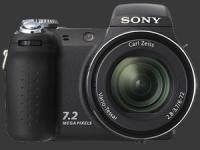Sony Cybershot DSC-H5 Review
Sony Cybershot DSC-H5 Usability - How easy is it to use?
At first sight, the Sony Cybershot DSC-H5 shows stylish curves among a relatively simple design. This ultra-zoom digital camera feels surprisingly light considering its 12X optical zoom lens. It is also relatively small. Among cameras with 12X optical zoom, only the Canon Powershot S3 IS and the Kodak Easyshare Z712 are smaller and lighter. The H5's light weight makes it quite portable but does not feel so durable. Larger ultra-zoom cameras such as the Panasonic DMC-FZ30, feel considerable more sturdy.

Design wise, the Sony H5 is reminiscent of a miniature DSLR with a deep hand-grip, angled shutter-release, front control-wheel, protruding lens barrel and rotating mode dial. The grip is deep and mostly comfortable once the optimal position is found. The key is to hold the camera at an angle so that the forefinger lands on the shutter-release and the thumb falls on the zoom controller. This way, it is possible to hold the camera tightly without having the metal eyelet for the strap dig into your hand. After a day of shooting though, you may notice the camera's rear lower right corner pressing against the ball of your hand.
The rear side of the H5 is dominated by a high-resolution 3" LCD, leaving very little room for anything else. The LCD has excellent visibility in most lighting conditions. Even in direct sunlight, the subject is distinctively visible. In low light, the LCD gains up slightly, just enough to see the brighter parts of the subject. When moving the camera, ghosting is frequently apparent. This is probably due to a slow refresh rate and large display size.
To accommodate such a large LCD, Sony had to pack numerous controls into a small area. While this is admittedly better than removing them, the placement of some controls is problematic. The 4-way controller which is used for menu navigation, changing flash mode, toggling macro mode, activating a self timer and exposure compensation is too low, making it difficult to use while maintaining a solid grip on the camera. The display and menu buttons are prone to accidental activation. While it happened only a few times during testing, several review sites noted this including DP Review and Imaging Resource. Lastly, the power, stabilization and playback buttons are so flush that they are nearly impossible to press with gloves on. This may not apply to everyone, but if you shoot in cold winter places, it is worth knowing.
Still on the subject of controls, the zoom controller is easy to use and its pressure-sensitivity is efficient for zooming over such a large range. The harder you press, the faster it zooms. Behind the shutter-release are easily accessible buttons for changing the focus mode and the drive mode. These two buttons are very easy to use while shooting without shifting your grip. It would be really nice if they would control white-balance and ISO or simply be customizable.

The Sony Cybershot DSC-H5 also includes a tiny EVF which conveniently protrudes from the camera's back. This is a nice design touch rarely found on digital cameras. Even high-end digital SLRs often have their viewfinder flush with the camera's back. With this design, one's nose does not press as much against the rear LCD. The view through the EVF is bright and clear but quite small.
In use, the Sony H5 is straight forward. Most controls behave as expected. The shutter-release is quite sensitive with a slight halfway point for locking exposure and focusExcept when in continuous-focus mode. In shooting mode, pressing a direction on the 4-way controller rotates through various settings. Up is for the flash mode except for the redeye reduction setting, which is chosen separately using the setup menu. Right toggles macro on and off. Down sets a 10 second timer, a 2 second timer or no timer at all. Left enters or exits exposure compensation mode. The 4-way controller is also used for navigating the menu system which is entered and exited using the Menu button. Strangely, the center button is neither used to confirm menu selection nor to dismiss the menu system. Instead the center button is used for manual focusing and focus point selection.

Near the top of the grip, there is an unusual control-wheel. Like with most advanced cameras, the control-wheel is used to change aperture, shutter-speed and exposure compensation. The particularity of this control-wheel is that it can be pressed like a button. Initially, the control wheel changes a single parameter: aperture in aperture-priority mode or shutter-speed in shutter-priority mode. When pressed, the wheel changes which parameter is changed. It must be pressed again to actually let the wheel control the newly chosen parameter. Why it does not simply toggle between parameters is a mystery. In each more there are always two parameters: aperture and exposure compensation (A), shutter-speed and exposure compensation (S), aperture and shutter-speed (M) or shift and exposure compensation (P). Toggling would save two wheel presses and one rotation every time! The second mystery is why the wheel cannot be pressed to select exposure compensation in P (automatic exposure) mode? It works in S, A and M modes. In automatic exposure mode, the left arrow of the 4-way controller must be pressed to allow the control wheel to set exposure compensation. This is actually the only circumstance where the left-arrow is needed to change exposure.
 When off, the Sony H5 is protected by a very sturdy lens cap which holds securely to the lens barrel. A nifty feature is that the camera indicates when the lens cap is on thanks to a small peg on the inside of the lens barrel. On the lens cap, there is also a small eyelet which can be used to strap the cap to the camera. Note: such a strap was not included in our evaluation unit but may be included in retail boxes, depending on the place of purchase.
When off, the Sony H5 is protected by a very sturdy lens cap which holds securely to the lens barrel. A nifty feature is that the camera indicates when the lens cap is on thanks to a small peg on the inside of the lens barrel. On the lens cap, there is also a small eyelet which can be used to strap the cap to the camera. Note: such a strap was not included in our evaluation unit but may be included in retail boxes, depending on the place of purchase.
The camera is equipped with a tripod mount which is in-line with the camera's center rather than the lens' center. This is ideal for stability but not for panoramas without special gear. Also on the bottom-side, there is a combined battery and memory compartment door. The H5 accommodates 2 AA batteries for power and Memory Stick Duo cards for storage. Note that Sony requires the use of a Memory Stick Pro Duo card for recording movies of the highest quality. AA batteries are cheap and very practical. Memory Stick Duo cards are priced higher than other common formats such as Secure Digital and Compact Flash. This must be considered in the camera's total cost. The door has a double-hinge design which would be clever if it were not very difficult to take out the memory card without opening the second hinge.

 |
Please Support Neocamera
All information on Neocamera is provided free of charge yet running this website is a huge endeavor. Purchases made via affiliate links found throughout the site help keep it running and up-to-date. There is no additional cost to you, so please consider buying via these links to our affilates:
If you found any information on this site valuable and did not purchase via our affiliate links, please considering donating via PayPal:
Any amount will be greatly appreaciated. Thank you for your support!
Sony DSC-H5 Highlights

Sensor-Size: 6 x 4mm

Actual size when viewed at 100 DPI
| 7 Megapixels Ultra Zoom | ISO 80-1000 |
| 12X Optical Zoom | Shutter 1/2000-30s |
| Built-in Stabilization | Full manual controls |
| 0.20" Built-in EVF 200K Pixels | Custom white-balance |
| 1.1 FPS Drive, 7 Images | Spot-Metering |
| 640x480 @ 30 FPS Video Recording | Standard AA Battery |
| 3" LCD 230K Pixels | Memory Stick Duo, Internal Memory |
Updates
2025.01.18

Fujifilm GFX 2025 Lens Roundup
Lens Review roundup of Fujifilm GFX Medium-Format lenses. Quality, performance and handling of the GF20-35mm F/4R WR, GF30mm F/3.5 Tilt-Shift and the GF55mm F/1.7.
2024.11.18

Best 2024 Photography Gifts for Every Budget
Great gifts for photographers and photo enthusiasts selected for every budget among the best products of 2024.
2024.08.07

Eye Protection Tips for Professional Photographers
The four main considerations for professional photographers regarding eyewear.
2024.07.14

Fujifilm X100VI Review
Flagship fixed-lens compact digital camera with a 40 MP sensor and Image-Stabilization, a first for the series. Retro design featuring dual control-dials, plus direct ISO, Shutter-Speed and EC dials. Its hybrid viewfinder can switch between EVF and OVF mode.
2024.05.09

Fujifilm GFX100 II Review
Flagship 102 Megapixels Medium-Format Mirrorless Digital Camera with 8-Stop 5-Axis IBIS, 8 FPS Drive, 8K Video and 400 MP Super-Resolution capture in a weatherproof and freezeproof body with dual control-dials and dual memory-card slots.
2024.04.03

Fujifilm X-T5 Review
Newest Fujifilm flagship boasting a 40 MP APS-C sensor, 5-axis IBIS with 7-stop efficiency, 15 FPS continuous drive, 6.2K Video capture, dual control-dials and dual SDXC UHS-II slots in a sturdy weatherproof and freezeproof body.
2023.11.20

Best Digital Cameras of 2023
Find out which are the Best Digital Cameras of 2023. All the new Mirrorless Digital Cameras from entry-level to high-end professional.
2023.07.10

Fujifilm X-H2 Review
40 Megapixels APS-C Hybrid Mirrorless Digital Camera with 7-stop IBIS. Fastest shutter ever and 8K video capture. Large builtin EVF with 0.8X magnification and 5.8 MP, plus an Eye-Start Sensor. Packed with features and large number of controls in a weatherproof and freezeproof body.
2023.05.07

Sony FE 20-70mm F/4G Review
Review of the unique Sony FE 20-70mm F/4G lens. The optical zoom of this lens spans ultra-wide-angle and medium focal-length coverage, making it one of the most versatile Full-Frame lenses on the market.
2023.01.15

Huion Inspiroy Dial 2 Review
Review of the Huion Inspiroy Dial 2 tablet, a medium sized drawing surface with dual dials and customizable buttons. Connects via USB-C or Bluetooth 5.0 with Windows, Linux and Android support.
2022.12.08

How to Pack for a Photo Trip
Find out how to pack for a travel photography trip, carry your gear safely while meeting airline regulations.
2022.11.13

Best Digital Cameras of 2022
The best digital cameras of 2022. A short list of the most outstanding models in their respective categories. Choose one for yourself or as a gift.










